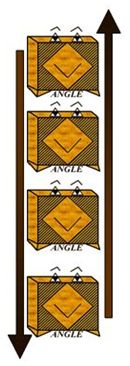LEVEL ONE — THE BASICS
Preparing for BOWING EXERCISE # 1
Tap the Contact-Point on Every String Level
Tap the Contact-Point on Every String Level
This bowing exercise teaches you to apply Leverage!
To the right, Angle is displayed four times, representing each Bow-Arm Box string level.
Level One Bowing Exercises, are to be performed at the Middle String Lane.
(Halfway between the bridge and the edge of the fingerboard.)
Remember to keep your Shoulder Arc relaxed and to swing your Bow-Arm Box to the proper string level.
Leveraged weight from your upper arm, gives power to your bowing motions.
Leveraged weight from your upper arm, gives power to your bowing motions.
Your elbow floats to position and acts as a hinge, continuing the flow of arm weight into bowing motion. Your Bow-Hand is now powered and ready to perform.
In this exercise, you will learn Bow Taps on every string level.
Bow Taps are performed by leaning the bow’s stick onto the bow hair at the contact-point.
Always direct your bow-hand into the index finger’s center segment Index Zone contact location.
Always direct your bow-hand into the index finger’s center segment Index Zone contact location.
Do not move the bow horizontally. Silently tap the bow’s stick and hair onto the contact-point.
Now, let’s perform Bowing Exercise #1.



Introducing the Bow Parts of the Bow The Stick Horse-Hair The Tip The Frog The Winding How the Bow Works
Rosin Preparing to Hold the Bow Stick Training Exercises Bowing Terminology Down-Bow Up-Bow
Bow-Hand Set-Up Finger Tasks and Functions The Thumb Meet ARC Finger Segments The Index-Finger
Bow-Hand Pronation The Center-Finger and Ring-Finger Bow-Hand Fulcrum Ring-Finger Propulsion Bass Bows
Pinky Bow-Tasks ‘Casting’ the Bow-Hand Bow-Wrist Tasks Rotational Inertia Arco Clay Smile Exercise Meet ANGLE
The Bow-Arm Box The Shoulder Arc Bow Contact-Point String Lanes Bow-Segment Mastery Bowing Exercises
Finding the Bow Contact-Point “Painting With Sound” Bowing Exercises Menu Bow Taps Bowing Traditions
Perform Down-Bows Perform Up-Bows The Art of the Bow-Change Articulations Staccato Legato
Mastery Checkpoint One Building Bow Control Bow Speed and Bow-Arm Motion Bow Planning and Distribution
Slow Moving Bow Strokes Individual Bow Segments Traveling the Bow Bowing Dynamics Mastery Checkpoint Two
Advanced Techniques Slurs and Articulations Slur Training Locating the Bow’s Balance Point Ricochet and Spiccato
Exploring Ricochet Ricochet Control Spiccato Training Spiccato Control Spiccato Brush Strokes
Multiple String Crossings Virtuosic Bow Strokes Arpeggio Bowing “Flying” Staccato Mastery Checkpoint Three
SCROLL’s List of Bow Strokes
Rosin Preparing to Hold the Bow Stick Training Exercises Bowing Terminology Down-Bow Up-Bow
Bow-Hand Set-Up Finger Tasks and Functions The Thumb Meet ARC Finger Segments The Index-Finger
Bow-Hand Pronation The Center-Finger and Ring-Finger Bow-Hand Fulcrum Ring-Finger Propulsion Bass Bows
Pinky Bow-Tasks ‘Casting’ the Bow-Hand Bow-Wrist Tasks Rotational Inertia Arco Clay Smile Exercise Meet ANGLE
The Bow-Arm Box The Shoulder Arc Bow Contact-Point String Lanes Bow-Segment Mastery Bowing Exercises
Finding the Bow Contact-Point “Painting With Sound” Bowing Exercises Menu Bow Taps Bowing Traditions
Perform Down-Bows Perform Up-Bows The Art of the Bow-Change Articulations Staccato Legato
Mastery Checkpoint One Building Bow Control Bow Speed and Bow-Arm Motion Bow Planning and Distribution
Slow Moving Bow Strokes Individual Bow Segments Traveling the Bow Bowing Dynamics Mastery Checkpoint Two
Advanced Techniques Slurs and Articulations Slur Training Locating the Bow’s Balance Point Ricochet and Spiccato
Exploring Ricochet Ricochet Control Spiccato Training Spiccato Control Spiccato Brush Strokes
Multiple String Crossings Virtuosic Bow Strokes Arpeggio Bowing “Flying” Staccato Mastery Checkpoint Three
SCROLL’s List of Bow Strokes





